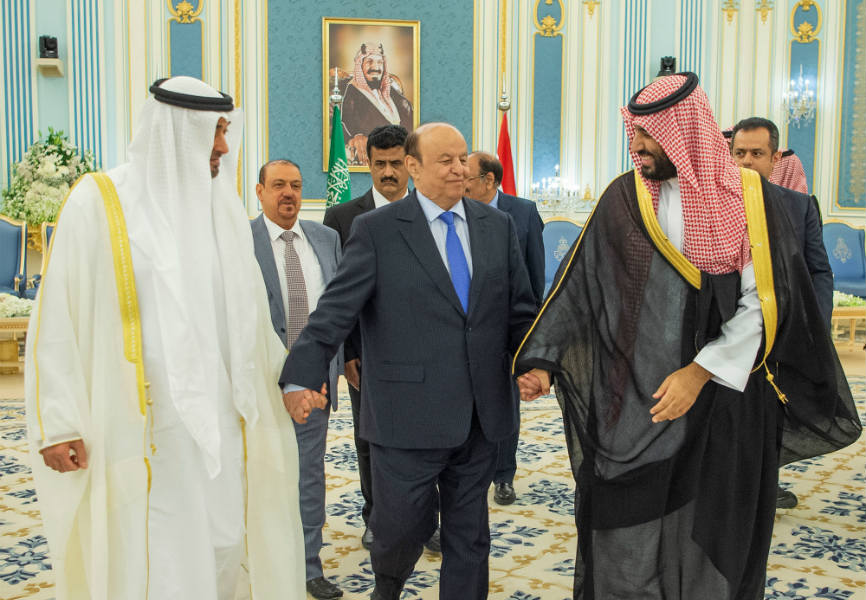Yemen's internationally recognized government reached an agreement Tuesday in Saudi Arabia with a secessionist group to end the fight for control of Yemen's south. Eurasia Group Middle East experts explain what the deal between President Abdu Rabbu Mansour Hadi's government and the Transitional Political Council for the South (STC) means for the country's broader civil war and the world's worst humanitarian crisis.
What does the agreement achieve?
Since 2014, the government and the STC have both been fighting—with the support of a Saudi-led international coalition—Iran-backed Houthi rebels in the north of Yemen. But earlier this year, the two southern factions started fighting against each other over the STC's demands for greater autonomy. In August, the STC took control of the port city of Aden, where the government has been based since the Houthis seized Sana'a, Yemen's capital and largest city, in 2015.
The agreement signed Tuesday in Riyadh in the presence of Saudi Crown Prince Mohammed bin Salman and Abu Dhabi Crown Prince Mohammed bin Zayed will recognize the STC as a legitimate authority for the first time and give it a larger role in government. The accord likely represents the first step toward unifying the two sides' fighting forces. The STC is in a stronger position militarily than the government.
What are the prospects for a broader peace?
Should the agreement hold, the creation of a stronger, more coherent southern front could help pave the way for negotiations with the Houthis. Moreover, the newly empowered STC faction is less inclined than the government to escalate the conflict with the Houthis, as it is primarily concerned with gaining more autonomy.
Meanwhile, Hadi's Saudi backers are also seeking de-escalation. They will likely pressure him to stick to the agreement with the STC and move toward talks with the Houthis. The Saudis themselves are under mounting international pressure to put an end to the bloodshed: The US Congress voted to withdraw support for Riyadh's role in the conflict, while Germany imposed a ban on all arms deliveries to the kingdom. Saudi Arabia's coalition partners have already started to disengage. The UAE has been withdrawing its troops from Yemen since the summer, as have the Sudanese.
What are the obstacles to peace in Yemen?
The five-year war has triggered the world's worst humanitarian crisis with
over 90,000 people killed and over 20 million in need of assistance. While the agreement between the STC and Hadi is a move in the right direction toward stabilizing the country, many hurdles remain. The Houthis will likely try to undermine the new alliance and Hadi and the STC still have divergent views on the future of southern Yemen. Hadi and his allies will have to warm to the idea of greater decentralization for the alliance to survive. The agreement postpones discussion on these issues until after the resolution of the conflict with the Houthis, but if progress moves too slowly, tensions could flare. Also, the STC could use its new position in government to undermine Hadi, and if the balance of power does not hold, the two sides could revert to armed confrontation.
What does the broader region stand to gain from greater stability in Yemen?
Saudi Arabia has suffered the most fallout from the conflict in neighboring Yemen, in the form of frequent rocket attacks launched by the Iranian-backed Houthis against Saudi oil infrastructure. The conflict has also helped to fuel the kingdom's rivalry with Iran, which is suspected of launching the damaging
attack against the Saudi Aramco oil processing facilities in Abqaiq in September.
The Saudis are taking an increasingly pragmatic stance on regional foreign policy matters following the Abqaiq attacks, concerned about the impact of the deteriorating security outlook on investor confidence and public opinion. The country has traditionally been considered a safe haven in the Middle East. A de-escalation of hostilities in Yemen would make it more difficult for the Houthis to fire rockets into Saudi Arabia and help the kingdom's authorities contain social discontent. It would also help divert resources from a costly foreign conflict back home at a time when authorities have been forced to cut spending on social benefits.
Read our 2018 Year in Review: Middle East and North Africa to learn more.

 (From left) Abu Dhabi Crown Prince Sheikh Mohammed bin Zayed, Yemen's President Abdu Rabbu Mansour Hadi, and Saudi Crown Prince Mohammed bin Salman in Riyadh. REUTERS.
(From left) Abu Dhabi Crown Prince Sheikh Mohammed bin Zayed, Yemen's President Abdu Rabbu Mansour Hadi, and Saudi Crown Prince Mohammed bin Salman in Riyadh. REUTERS.